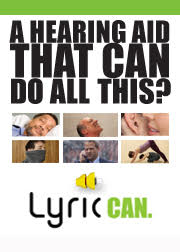Embedded computer chips make hearing aids come in loud and clear By: Drs. Oz and Roizen Health Advice, Published on Tue Apr 16 2013 Q: I’m turning 60 next week, and maybe all those rock ‘n’ roll concerts I went to are finally taking their toll on my hearing. I think I need a hearing aid, but I don’t want to look like my grandmother. Any advice? — Adele, C., Boulder, Colo. A: Oh, yes. For you—and all the rock ‘n’ rollers in their 60s and 70s—the answer to “Tommy, can you hear me?” finally might be yes, because of the amazing breakthroughs audiologists are making these days. For those of us old enough to have experienced the British Invasion (The Beatles, The Rolling Stones,…
Archives
Protect Your Child’s Hearing
Understanding the Threat of Noise Noise is one of the greatest threats to your child’s hearing. But unlike many causes of hearing loss, preventing hearing damage from noise is largely within our control. Noise threatens our hearing because we hear sound when delicate hair cells in our inner ears vibrate. This creates nerve signals that the brain understands as sound. If we overload these delicate hair cells with exposure to loud noises, we damage them. This results in sensorineural hearing loss and often tinnitus—or “ringing in the ears.” The hair cells that vibrate most quickly—and that allow us to hear higher-frequency sounds like birds singing and children speaking—usually become damaged, dying first. Noise in our everyday lives may be damaging even to a child’s hearing,…
Father’s Day: Give Dad the Gift of Hearing
Father’s Day is a great time to think about the crucial role that dads play in the lives of their children and grandchildren. So, before reaching for this year’s tie, hand-tool, or trinket, how about a gift that will really strengthen the connection between you and your father — the gift of better hearing? While it may sound unusual, there’s probably no better gift for a dad with an untreated hearing loss than one of the new, digitally-advanced, and remarkably small hearing devices. “Think of it as the world’s smallest power tool,” said Sergei Kochkin, Ph.D., executive director of the Better Hearing Institute. “Today’s hearing devices can amp-up your dad’s hearing and strengthen his ability to communicate clearly and easily with his family.” Hearing loss…
What is the Best Hearing Aid for You?
There is nothing more important to the manufacturers of hearing aids and your Audiologist than your satisfaction with their product and services. Like any smart professional, they know that satisfied clients lead to repeat business and to positive word-of-mouth advertising for their products. Because their customers often ask the same question: What is the best hearing aid for me? The answer is that the best hearing aid is a device for one or both ears that best helps you address a hearing impairment. The hearing aid industry is interested in delighting you, in meeting your needs and finding the best hearing aids for you. The industry is people-oriented in that it allows significant interaction and communication between the person with the hearing loss and the…
Hello world!
Welcome to WordPress. This is your first post. Edit or delete it, then start blogging!
Loud and Clear
Hear that? It’s the sound of a technological revolution for the hearing impaired. Bluetooth® wireless technology turns hearing aids into headsets for phones, MP3 players and more. By Karen D. Schwartz There was a time, not too long ago, when hearing-impaired individuals who use hearing aids had to wait to reach a landline before they could make or accept business calls. Cell phones tended to create so much audio feedback in the hearing aids that it could be difficult to hear conversations. “Conventional hearing aids and cell phones used together is problematic, because there is a lot of static, usually from radio interference, which causes a lot of static sound in hearing aids,” explains Crilles Bak Rasmussen, a research and development engineer for Copenhagen, Denmark–based Oticon A/S. “Those…
Hearing and Wellness Show: April 23
Visit www.hearingandwellness.ca for more information!
Researchers Create Software For Google Glass That Provides Captions For Hard-Of-Hearing Users
Provided by Jason Maderer, Georgia Institute of Technology A team of Georgia Institute of Technology researchers has created speech-to-text software for Google Glass that helps hard-of-hearing users with everyday conversations. A hard-of-hearing person wears Glass while a second person speaks directly into a smartphone. The speech is converted to text, sent to Glass and displayed on its heads-up display. A group in Georgia Tech’s College of Computing created the Glassware when one of its own said he was having trouble hearing and thought Glass could help him. “This system allows wearers like me to focus on the speaker’s lips and facial gestures,” said School of Interactive Computing Professor Jim Foley. “If hard-of-hearing people understand the speech, the conversation can continue immediately without waiting for the…
Love Your Heart, Test Your Hearing for World Heart Day, the Better Hearing Institute Urges
Your heart and hearing may have more in common than you realize says the Better Hearing Institute (BHI),(www.BetterHearing.org) which is raising awareness of the link between hearing loss and cardiovascular disease for World Heart Day, September 29. A growing body of research shows that a person’s hearing health and cardiovascular health frequently correspond. So BHI is encouraging people to take a free, confidential, online hearing check at www.BetterHearing.org to help determine if they need a comprehensive hearing test by a hearing healthcare professional. Studies show that a healthy cardiovascular system—a person’s heart, arteries, and veins—has a positive effect on hearing. Conversely, inadequate blood flow and trauma to the blood vessels of the inner ear can contribute to hearing loss. David R. Friedland, MD, PhD, Professor…


